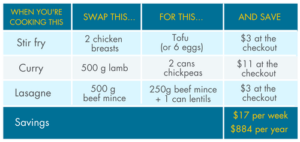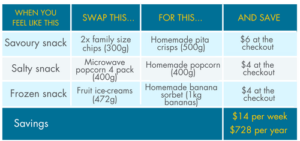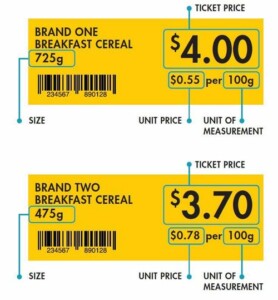Across the country, we’re all feeling the pinch of a rising cost of living and for many of us this is being felt most in our regular trips to the supermarket.
With inflation at the highest it has been since 2009 and the costs of our everyday groceries climbing higher and higher it can feel like a real challenge to maintain a healthy, balanced trolley without breaking the bank.
The good news is, there are a lot of handy tricks we can use when prices are on the rise to cut costs whilst still purchasing a wide variety of products from the five core food groups recommended for a healthy diet (vegetables, fruit, grains and cereals, meat and meat alternatives and dairy and dairy alternatives) – we just need to get a little creative.
To help you shop well and save at the checkout, LiveLighter® have put together some of their top tips below.
1. Buy in season
Not only are fruit and vegetables freshest and most delicious when they’re in season, this is also when they are the best value. This is because when these foods are in season is when they are at their greatest supply and high supply means cheaper prices.
Frozen fruit and vegetables are also nutritious, quick to prepare and often a cheaper way to buy fruit and vegetables.
If you’re unsure about when your favourite fruits and vegetables are in season, download our seasonal calendars to find out the best times to buy this fresh produce.

2. Make healthy swaps
Getting creative with our shopping list can help us replace pricey ingredients with something cheaper that still provides similar nutritional benefits.
If your favourite meat cut is too expensive, try swapping it out for eggs, tofu or a can of chickpeas. If you enjoy the meat flavour, try swapping half the required meat and with other sources of protein such as lentils, which remain relatively consistent in price throughout the year.

3. Plan your meals
There are many benefits to planning your meals: saving time, money, reducing stress and cutting back on waste.
Set aside a few minutes every week to brainstorm your meals and try to choose meals that share some of the same ingredients to cut costs and reduce food waste by using the leftover ingredients.

4. Write a list and stick to it
Shopping once a week can help you cut down on impulse purchases such as unhealthy foods and drinks you didn’t really need. Once you’ve planned your meals for the week write a list of all the ingredients you need and only buy from the list. Two for one deals and promos can make it tricky to stick to the list, so try to only go down the aisles you need to, to avoid tempting promotions.
Remember: The outside edges of the supermarket are where the fresh food is stored, so sticking to the areas around the aisles and only going down the aisles you need to can help you avoid adding pricey packaged foods to your trolley that aren’t on your list.

5. Cut back on costly snacks
Unhealthy foods marketed as snacks are often full of fat, salt and sugar and carry a hefty price tag without providing any nutritional benefits. Try making some of your favourite snacks at home using ingredients you already have in the pantry.
Snacks such as pita crisps, popcorn or banana sorbet can be whipped up with only a couple of ingredients in little time. These homemade snacks are not only cheaper but they’re also healthier and will keep you fuller for longer.

6. Use unit price to find the best value
Unit pricing can help us compare the cost of products when they come in different sized packets and tell which items are the best value (not just the cheapest). Look out for the for the price per 100g, per litre or per kilo to compare like products.
Buying in bulk can be a lot cheaper, but this is only the case if you are going to use all of the food before it goes off. Try purchasing larger packs and splitting them into smaller serves using containers. If the food is freezer-friendly, you can freeze some of the serves to make it last longer.

For more information
- Check out LiveLighter®’s Shop Smart Hub for more tips, information and resources to help you spend more of your budget on healthy foods while saving money at the checkout.